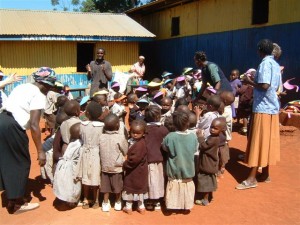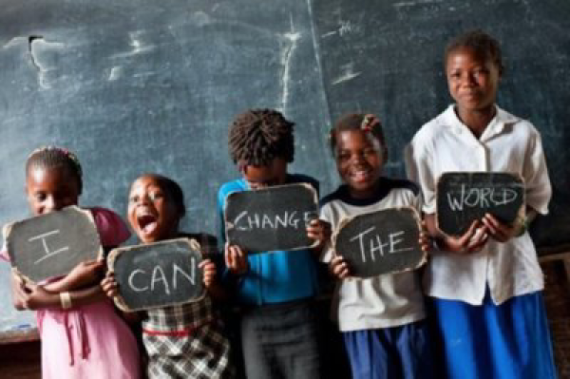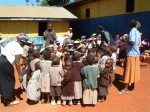 In a recent post on evangelism, an African evangelist posted some comments that I though were quite good. His name is Godfrey Mawa, and here is what he wrote about how western missionaries often spend money on their African mission trips (I edited his comments somewhat for this post):
In a recent post on evangelism, an African evangelist posted some comments that I though were quite good. His name is Godfrey Mawa, and here is what he wrote about how western missionaries often spend money on their African mission trips (I edited his comments somewhat for this post):
Your thoughts are great and there are very few people who have such a heart and who are willing to help native missionaries to impact their villages, cities and nations.
I agree with what you wrote: native African missionaries are more effective than visiting missionaries. I can’t be more effective than a trained American evangelist in reaching Americans for Christ as many barriers will hinder me from efficiency.
Over the span of the past years, I have seen many missionaries spend hundreds of thousands of dollars on air flights, expensive hotel bills, and other expenses. Yet in Africa, $10,000 will do a significant evangelistic work, or buy land for a school project, an orphanage or anything that can add value to the kingdom of God.
Nevertheless, some Christian relief missionaries will spend $100,000 to bring in donations worth $1,000 . I saw this during our recent mission to the war-torn Northern Uganda (in response to Joseph Kony and LRA rebels insurgencies/atrocities that lasted for over 20 years). It was not uncommon to see a missionary using a private jet, spending their stay on safaris and first-class hotels, while they give one-time foodstuffs and used clothes as donations. Of course, while they are handing out the food and clothing, they also take lots of good pictures and videos for their Praise Reports.
I have evaluated that, as a native African missionary, my team and I can do more effective work in evangelism with $10,000 than a visiting missionary can do with $100,000.
A lot of churches in the developed world believe in their own trained missionaries and that’s why they would rather spend the larger amount. There is some legitimacy to their concern. Sometimes they have heard of or dealt with the wrong native persons before examining or training them, and these native African missionaries have disappointed them. This has killed the trust for native African missionaries. Nevertheless, there are still great native African missionaries who will work unto changing their communities and people towards the values of Christ.
My prayer is that churches and missionaries will use God given resources with good stewardship, as evangelism yields amazing fruits. The needy orphans, widows and helpless people helped and nations changed with a holistic approach. That way, the Lord will be praised! The nations will declare His praises.
At my request for more information about his missionary team, he sent in this information:
I am available to advise any missionaries interested in doing a mission work in Africa on how to be cost effective, yet with great results/fruits for the Lord’s kingdom. We have diverse experience ranging from all forms of evangelistic missions, relief and aid, leadership training and development, orphans, widows and the elderly, awareness and sensitization, among others. You can also see some pictures on our mission website or the following Facebook links;
https://www.facebook.com/malipuko
https://www.facebook.com/godfreymawa
https://www.facebook.com/afrikidzuganda
https://www.facebook.com/pages/Commission-International/114524275303169Our organization has opportunities for individuals or groups of those interested in coming for mission experience in Africa.
I am doing to get you a list of advise for missionaries coming to Africa or third world countries, with an effective mission yet, without wasting finances and resources.
Thanks again Jeremy, for the great work. I know many are going to be helped.

Please note that I am not “endorsing” Godfrey’s African mission. He and I have never met and I have never worked with him in doing any sort of missions in Africa. I have posted his information because he validates what I have found to be true in my own experience, and what I have read in numerous other books about the best and most cost-effective way of doing evangelism and missions in other countries, especially in places like Africa.
What books?
Here’s two:
When Helping Hurts
The Spontaneous Expansion of the Church




We learned this from our partnership with Samuel Ssengooba Mugabi in Uganda. I’d say – Think *Western Union* in your “benevolent” efforts, rather than *United Airlines.*
Is there a list of native Free Grace missionaries that can be supported?
There is a sign over the door leading out of a local church that I think sums it up best: “You are now entering the mission field”.
It is sad to say this, but, I would want to be certain that ALL of the money given is sent to these beautiful people so they can benefit from it. I see high end entertainers being spokespeople for charities and I, sadly, have to wonder how much they may be getting for doing the commercials.
On a lighter note, would it be out of line to say that we should go over there with some buses and U-Hauls and take them to where the food and better shelter is? Just a thought…
For the world in general, and Africa in specific, the issue is not food production. Rather it is food distribution, and the cost of that food.
I’ll skip the lecture on politics, and the use of food as a tool of genocide.
As far as housing is concerned, the primary issue is the supporting infrastructure. Running water, sewage, trash collection, electricity, internet service, cellular phone service, etc.
The “hard issue” is swage and trash collection. Composting toilets go so far. Burning trash goes so far. Neither are the always ideal solution.
The secondary issue is the cost of “hardening” the housing to survive the major, local natural disasters — flood, fire, earthquakes, tornadoes, snow, lhasas. tsunamis, etc.
A basic (A11Y compliant) 800 square foot house (2 bedrooms 1.75 bath, kitchen, living room) that can survive most of those hazards, costs 30K plus shipping.
* Flood “protection” costs are estimated at $45K, for the Mississipi river valley, assuming a flood that is less than 40 feet above the median high tide mark. My guess is that the cost would be about the same, regardless of where on the planet one is;
* As is, short of a direct hit, tornadoes are not an issue. A direct hit might destroy everything. Direct tornado hit hardening costs at least $750K, if you don’t go underground;
* Tsunami protection is basically the same as flood protection. Shee forces are much higher, because the water comes from above, not below. This difference makes it more expensive to construct;
I think that aid to Africa can be done much better than by sending expensive missionaries over there, but I don’t know how to go about trucking food all over the continent. I am not even sure that would provide much help in the long term….
Thank you Jeff Stewart we are glad to have you and your effort towards this mission work here in Uganda…Everyone have time and check out this page; http://www.samuelskids.org
K P Yohannan makes essentially the same point in _Revolution in World Missions_.
Everytime I read of a church going to mission work for betweeen a week and quarter, in a second/third/fourth/fifth world country, I inwardly cringe. The local congregation has to budget three month of clearing up the damage, for every day the group is in-country. IOW, that seven day mission work your US-based church does, requires 21 months of work by the local congregation, fixing things that were broken by that US-based church’s trip.
Back in the early seventies, at one church I was at, there was a vigerous debate about increasing the budget for soap for the ladies bathrom from $5,000 per year to $10,000 per year. Somebody shouted out: “For Gd’s sake, five thousand dollars will build a church for one of those congregations in Africa that meets under the trees”.
I need to read that book again. I read it 15 years ago or so, but have forgotten most of it.
Anyway, yes, I have heard the same thing about the hidden “costs” of western mission’s trips.
I have supported various missionaries through Gospel for Asia over the years. Read Revolution in Missions to get the picture. The amount of money spent by western Christian organizations to reach the lost with the westernized version of the gospel is appalling. Indigenous missionaries can move within their home cultures and understand the differences. They can spread the message of Christ for a fraction of the cost of sending a western missionary. This past Christmas my grandchildren and I bought a variety of animals and other products through a Christmas catalog they do annually to help those in need. Just having a goat can transform a family’s life in a profound way. It was also a great experience getting the grandchildren thinking about how good they have it, and how giving to others is far more gratifying at Christmas time.
Jeremy, are you a missionary in Africa or Uganda!
hope one day you will visit and you can check out the work we are doing here…please visit the page; http://www.samuelskids.org
Jeff Stewart, I love that!
Shawn Lazar, I am not aware of any. Are you?
No, sadly.
No. I have never even visited.
Dear friends – I strongly agree both with your post Jeremy and with the sentiments that Samuel shares in his response. At the same time I feel uncomfortable, because this is too much a caricature.
“It was not uncommon to see a missionary using a private jet, spending their stay on safaris and first-class hotels” – sorry Samuel, I think that is exaggerating. That may have happened, but it would be uncommon. I know because I have served for 11 years as the regional director for Mission Aviation Fellowship in East-Africa. (I was based in Uganda, operating from Kajjansi, and more than a decade in Nairobi, operating from Wilson Aiport, with a subbase in Lokichoggio and Juba Sudan).
The nuances make a lot of difference here.
– some missionaries may have a lifestyle that is more common to their home culture than appropriate, but I know many others that have made financial and personal commitments that impress me and should not be ignored; I think we should continue to honor that
– the reality of the $10K that we all would want to invest in local evangelists often is only available after a ‘loo-see-visit’ (or more) from a Western missionary who returns ‘home’ for fundraising; that maybe sad, but is the reality
– one serious issue to address in the African churches is the ‘colonialism’ that is imposed (!) on any white face that shows anywhere. I show up in a church and I am immediately ‘a special man from God’ (am I? How do they know?), I am without any hesitation asked for financial support, more support and even more support (OK, I accept that may sometimes be culture – but is not healthy…) and any friendly response from me is cultivated and I suddenly find myself fundraising…
– if I would be allowed to spend $100K I would rather spend this NOT on evangelism by a Westerner, but also NOT on a local evangelist, but on quality leadership/bible college training for African leaders. From my perspective that is where the need is and where the multiplying benefit will come from.
Much more can be sad – we all know. This is my five-pence, thank you and God bless.
thank you for your comment because always exaggeration is not healthy. we have seen even some missionary who are living in local houses years and years to win soul for Christ. Not everything is bad only if you choose to focus on those bad ones.Be blessed
Bernard,
It is probably not so much a caricature as much as it does not represent ALL missionaries to Africa. I imagine that you have run into missionaries who fit the descriptions above? Thankfully, most missionaries do not fit this description.
Anyway, I think that what we need to do is just start reconsidering how best to carry out missions in continents like Africa. This post is just part of a much larger conversation that needs to he held.
Been reading some great books lately on missions, and orphans. My favorite has been by Philip Cameron, the book is They Call Me Dad. Brilliant look into the conditions these kids are living in. I think we don’t realize why they need help, his site is http://www.stellasvoice.org/they-call-me-dad/. Something to look at to gain perspective on this subject.
Thanks everyone for sharing through the above comments—ALL! I think we all need to do something and its high time to move from our comfort zone to start doing something! Can you hear the sound of the nations calling? Can you hear the cry of the hurting and the lost? Do you hear the voice of one calling “who shall go for us?” and “Whom Shall I send?” The Lord has touched us to touch others, changed us to change others, fed us to feed others, sheltered us to shelter others, Cloth us to cloth others, saved us to save others, given us work beyond working for a living, but for a giving.
The lost and hurting Kids in Uganda are waiting. Now is the time to reach out for the Lord’s Outcry. Lets partner in this great commission, to touch, change and impact lives towards the values of Christ Jesus.
I think we all need to find out how safely it is if its the need, and we can’t hide our eyes from the Orphans, poor and needy children in Africa- Uganda—lets do something!! Enjoy your visit and look forward to hear from you!
Samuel Ssengooba Mugabi– Fb: https://www.facebook.com/ssengooba.samuelmugabi
http://www.samuelskids.org
Children Saved by Jesus Ministry Uganda
P. O. Box 878,
Mukono Uganda
East Africa.